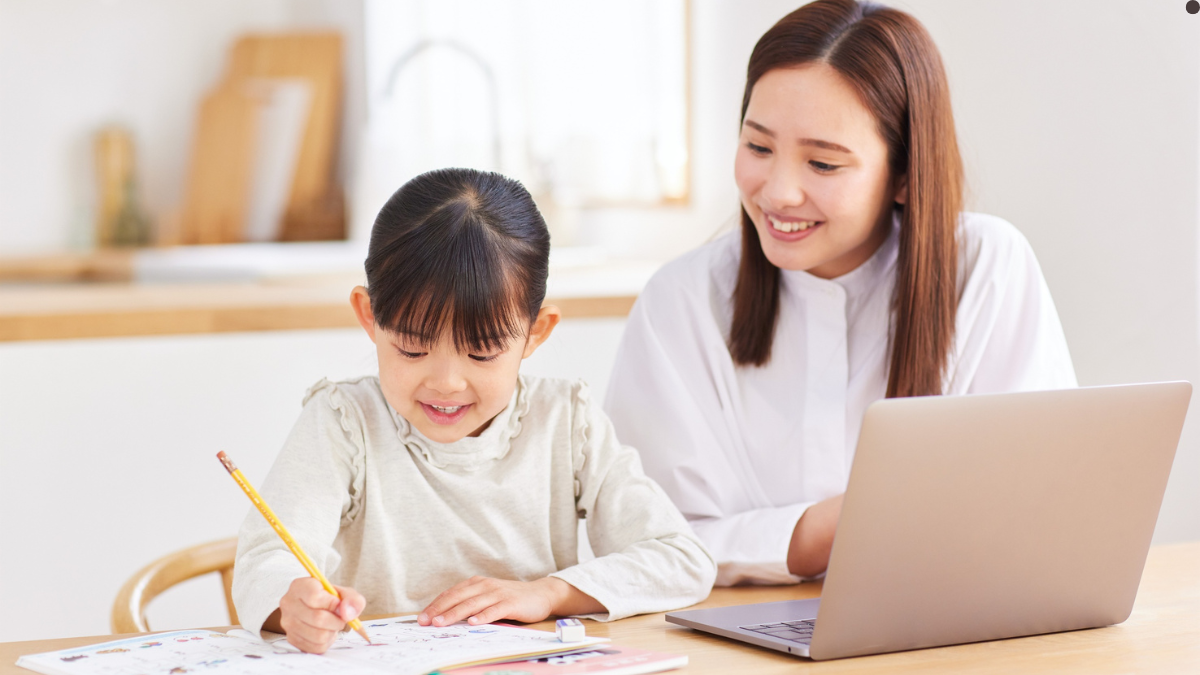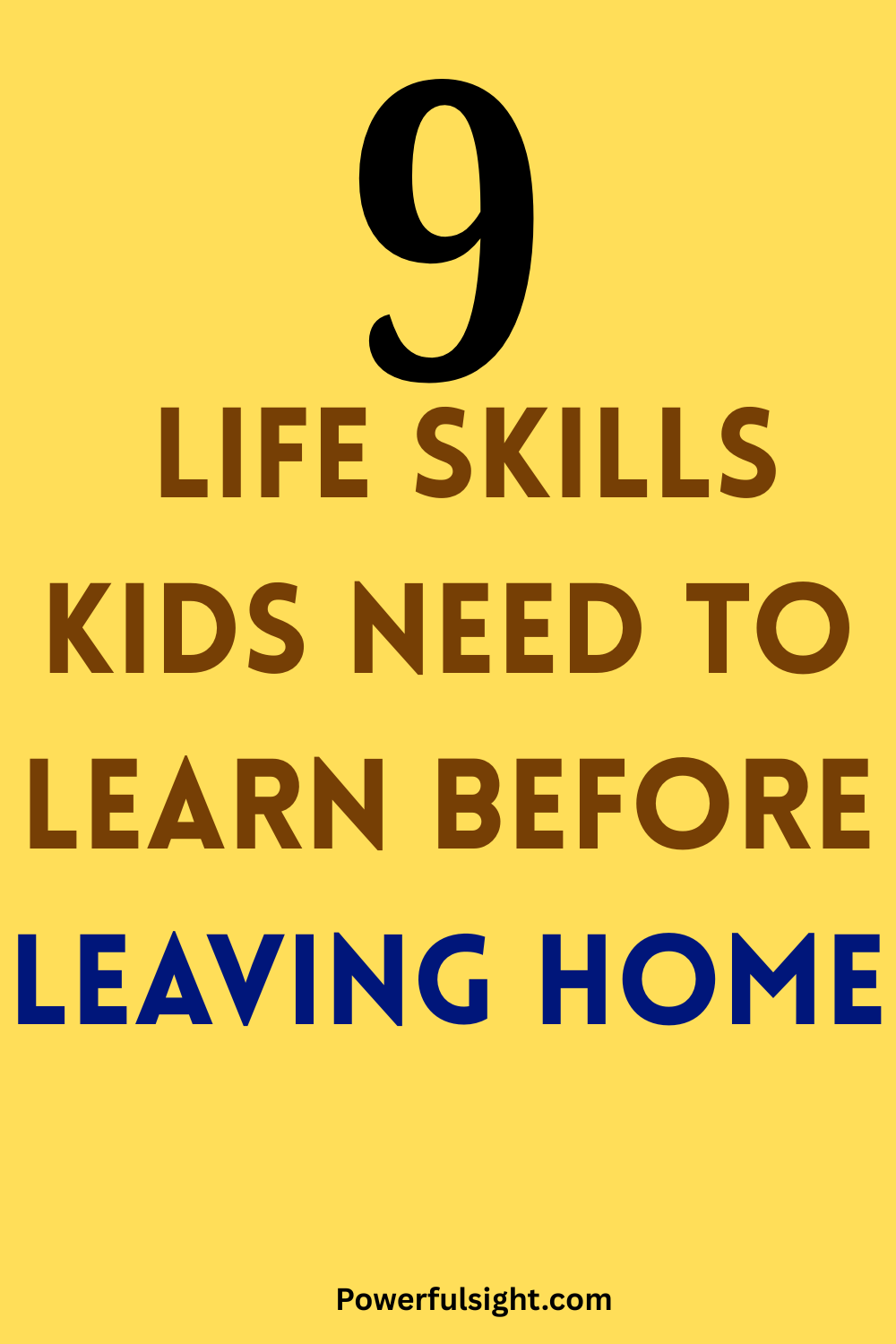Watching your child grow up and prepare to leave home is both exciting and a little terrifying. They might be heading off to college, starting a new job, or moving into their first apartment. Naturally, you want them to be prepared to handle life on their own.
They’ll face many challenges, from academic and professional pressures to adult relationships and personal health. Passing exams or finishing school isn’t enough to make them independent. Kids need to learn and practice real-life skills they can rely on.
Life skills are the practical knowledge, experience, and confidence that help children become adults who can stand on their own two feet. Every parent should aim to teach their kids these nine life skills—and not just how to complete each task, but also why it matters.

9 Life Skills Kids Need To Learn Before Leaving Home
1. How to Manage Money
One of the first and most important adult lessons to learn is how to be financially independent. This includes not only budgeting and saving but also understanding how money works. From a young age, children can be introduced to earning, spending, saving, and budgeting.
For instance, they can learn to save part of their allowance, compare prices while shopping, and practice delayed gratification by saving for something they really want. As they grow older, they should also be introduced to more advanced financial responsibilities such as:
-
Creating and following a simple monthly budget
-
Using and maintaining a bank account
-
Understanding credit, credit cards, and how to avoid debt
-
Paying bills on time
-
Building an emergency fund
Parents may also want to discuss long-term savings and investments during the teenage years. The goal is not to make your child a financial expert but to equip them with the knowledge and discipline to make responsible, informed decisions.
Related: How To Make Your Life A Fairytale
2. How to Cook at Least a Few Basic Meals
Cooking is one of the most essential skills for independence. Everyone should know how to prepare simple, healthy, and affordable meals. Beyond nourishment, cooking is a basic survival skill and a way to care for oneself creatively and confidently.
At an early age, children can learn to make simple dishes like pasta, stir-fry, scrambled eggs, or rice and beans. Teach them how to:
-
Read recipes
-
Measure and prepare ingredients
-
Use basic kitchen tools safely
-
Store food properly to reduce waste
-
Prepare balanced meals with vegetables, protein, and carbohydrates
Cooking together as a family is a wonderful way to teach these skills while fostering an appreciation for healthy eating. It also opens up conversations about nutrition, food safety, and smart grocery shopping.
Related: How to Make Your Life Feel Like a Movie
3. How to Do Laundry and Basic Cleaning
It’s surprising how many young people reach adulthood without knowing how to do laundry or basic housework. Learning how to wash, dry, and fold clothes properly saves time, frustration, and ruined fabrics. Show your child how to:
-
Separate clothes by color and fabric type
-
Use the correct machine settings
-
Measure and add detergent properly
-
Treat stains and handle delicate items
Basic cleaning is equally important. Teach your child how to vacuum, wash dishes, clean bathrooms, make the bed, and tidy their living space. Clean surroundings promote health, focus, and a sense of pride in one’s home.
Related: How To Be Ambitious
4. How to Manage Time and Priorities
Time management is one of the most valuable life skills for young adults. The world is full of distractions, and learning how to balance responsibilities with rest is essential. Encourage your child to:
-
Use a planner or digital calendar
-
Set and follow realistic goals and deadlines
-
Break big tasks into smaller, manageable steps
-
Recognize the importance of rest and downtime
The earlier a child learns organization and discipline, the easier adult life will be. Good time management also helps reduce stress and improves focus.
Related: How To Be Grounded Emotionally
5. How to Communicate Effectively
Good communication is the foundation of healthy relationships, both personal and professional. Your child should learn to express their thoughts and feelings clearly and respectfully, and to listen actively to others.
You can model effective communication by:
-
Encouraging open discussions without judgment
-
Teaching them how to make professional phone calls or write proper emails
-
Helping them practice conflict resolution and empathy
-
Reminding them that respect is always mutual
In the digital age, it’s also essential to teach children how to communicate thoughtfully online. They should know how to protect their privacy and avoid using harsh or disrespectful language on social media.
6. How to Take Care of Their Health
Good health is more than the absence of illness—it’s the result of consistent, mindful habits. Teach your child the importance of regular exercise, enough sleep, and balanced nutrition. They should also know how to:
-
Schedule and attend doctor or dentist appointments
-
Recognize when to seek medical help
-
Treat minor illnesses or injuries with basic first aid
-
Take prescribed medication correctly
-
Manage and reduce stress
Mental health deserves equal attention. Encourage your child to care for their emotional well-being through journaling, mindfulness, or simply talking to someone they trust. A healthy mind and body are the true foundations of independence.
7. How to Handle Emergencies and Stay Safe
Knowing how to handle emergencies gives children confidence and peace of mind. Teach your child basic safety rules for home, travel, and online life. Make sure they know how to:
-
Call emergency services and when to do so
-
Use a fire extinguisher
-
Lock doors and windows properly
-
Handle car trouble, such as a flat tire
-
Protect personal information and identity online
You can also teach them small but important skills such as changing a light bulb, shutting off the water supply, or resetting a circuit breaker. These lessons foster self-sufficiency and reduce panic in unexpected situations.
8. How to Build and Maintain Relationships
Relationships are at the heart of a fulfilling life. Children should understand that healthy relationships—whether with family, friends, or colleagues—require effort and respect. Encourage them to:
-
Keep in touch with loved ones
-
Listen and remain polite, even during disagreements
-
Offer help and appreciation
-
Set and maintain healthy boundaries
Just as important, children must learn to recognize unhealthy relationships. Teach them when it’s necessary to walk away from toxic or harmful people. Emotional intelligence—the ability to understand and manage one’s emotions and those of others—is a vital skill for adulthood.
9. How to Think Critically and Solve Problems
Life rarely follows a straight path. When challenges arise, young adults need to think clearly, stay calm, and find solutions. Problem-solving is not about knowing every answer—it’s about knowing how to find one. Encourage your child to:
-
Analyze situations before reacting
-
Consider different viewpoints
-
Make thoughtful, informed decisions
-
Take responsibility for mistakes and learn from them
Allowing your child to face small failures helps them build resilience. If they forget their lunch or miss a deadline, don’t rush to fix it. These moments teach valuable lessons about accountability and perseverance.
Teaching These Life Skills Early
Teaching life skills is not a one-time lesson but an ongoing process. It works best when woven naturally into daily family life. You can:
-
Assign age-appropriate responsibilities
-
Involve your child in household decisions
-
Discuss real-world challenges openly
-
Encourage independence rather than perfection
Children who are trusted to make choices, face consequences, and solve problems develop maturity long before they leave home.
Final Thoughts
Parenting isn’t about preparing the road for your child—it’s about preparing your child for the road. These nine life skills may seem simple, but they are essential for independence and strong character. A child who knows how to budget, cook, clean, manage time, communicate, care for their health, and solve problems will not just survive—they will thrive.
Every small lesson you teach becomes a stepping stone toward a capable and confident adulthood. The greatest gift you can give your child isn’t just love or protection, but the tools to build a life they can be proud of.
Save the pin for later.

- 10 Signs Your Partner Genuinely Respects You - 06/12/2025
- 15 Things That Destroy Relationship Slowly - 06/12/2025
- How to Know If You’re Being Love Bombed - 06/12/2025